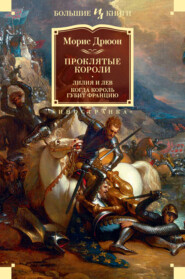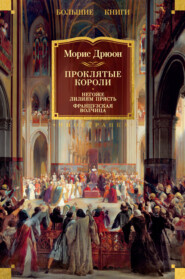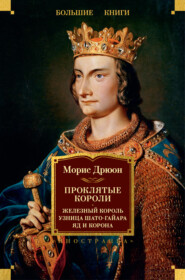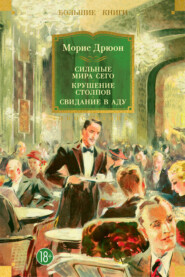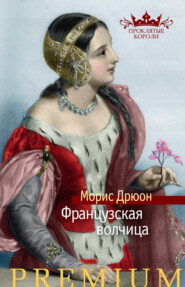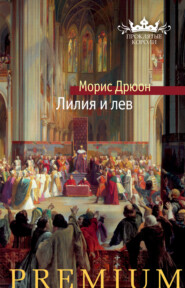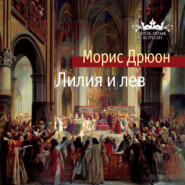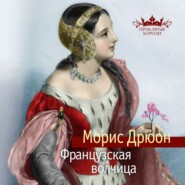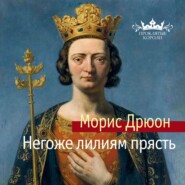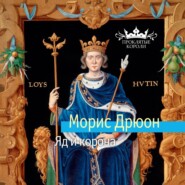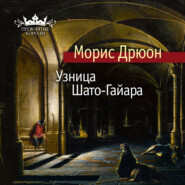По всем вопросам обращайтесь на: info@litportal.ru
(©) 2003-2024.
✖
The Lily and the Lion
Автор
Год написания книги
2019
Настройки чтения
Размер шрифта
Высота строк
Поля
Since the King of England delayed coming to render homage, it was once again decided to seize the Duchy of Guyenne. But before the threat was put into execution, Robert of Artois was sent to Avignon to obtain the intervention of Pope John XXII.
Robert spent two delightful weeks on the banks of the Rhône. For Avignon, to which flowed all the gold of Christendom, had become, for anyone who enjoyed high living, gambling and beautiful courtesans, an enchanted city over which ruled an ascetic, octogenarian pope withdrawn into the problems of the Beatific Vision. The new peer of France had several audiences with the Holy Father; a banquet was given in the pontifical palace in his honour, and he enjoyed much learned conversation with a number of cardinals. Nevertheless, loyal to the avocations of his turbulent youth, he also frequented persons of more doubtful standing. Wherever Robert happened to be, he did not need to lift a finger to attract loose women, wicked men and fugitives from justice. If there was but one receiver of stolen goods in a town, in the first quarter of an hour Robert had found him out. The monk expelled from his order for causing scandal, the priest guilty of larceny or violating his oath, were inevitably to be found in his anteroom in search of his support. He was often saluted in the street by persons of sinister appearance and he would try vainly to recollect in what brothel of what town he had run across them. There was no doubt that he was trusted by the underworld, and the fact that he had become the second prince in the kingdom made no difference.
His old valet, Lormet le Dolois, was too old now to make long journeys and had not accompanied him to Avignon. But a younger man, Gillet de Nelle, who had been trained in the same school, was charged with Lormet’s duties. It was, indeed, Gillet who discovered for Monseigneur Robert a certain Maciot l’Allemant, a native of Arras and unemployed sergeant-at-arms, who would stick at nothing. Maciot had known Bishop Thierry d’Hirson well; and Bishop Thierry, during his last years, had had a mistress called Jeanne de Divion, who was at least twenty years younger than himself. She was complaining bitterly of the way Countess Mahaut had been treating her since the Bishop’s death. Would Monseigneur like to see this Dame de Divion?
Not for the first time, Robert of Artois concluded that there was much to be learned from people of bad reputation. No doubt there were safer hands than Sergeant Maciot’s into which to confide one’s purse, but the man clearly had much interesting information. Wearing a new suit of clothes and mounted on a good horse, he was sent north.
When he returned to Paris in March, Robert of Artois was in high good humour, prophesying that there would soon be interesting news in the kingdom. He mentioned that royal documents had been stolen by Bishop Thierry on Mahaut’s behalf. And a woman with veiled face came frequently to see him in his study where he held long and secret conferences with her. As the weeks went by, he seemed ever happier and more confident, and foretold the imminent confusion of his enemies with increasing assurance.
In the month of April the English Court, yielding to pressure from the Pope, sent Bishop Orleton to Paris once again, with a train of seventy-two persons, lords, prelates, lawyers, clerks and servants, to negotiate the form the homage was to take. Indeed, it was nothing less than a treaty which had to be agreed.
The affairs of England were not going too well. Lord Mortimer had not increased his prestige by compelling Parliament to sit under the menace of his troops. He had been forced to suppress an armed rebellion of the barons under the leadership of Henry Wryneck, Earl of Lancaster, and he was finding great difficulty in governing the country.
At the beginning of May, gallant old Gaucher de Châtillon died in his eightieth year. He had been born in the reign of Saint Louis, and had been Constable for twenty-seven years. His determined voice had often affected the results of battles and had frequently prevailed in the King’s Council.
On May 26th young King Edward III, having borrowed, as his father had done before him, five thousand livres from the Lombard bankers to cover the cost of the journey, took ship at Dover to come and render homage to his cousin of France.
Neither his mother Isabella nor Lord Mortimer accompanied him, for they were afraid the power might pass into other hands in their absence. The sixteen-year-old King, under the tutelage merely of two bishops, set out to confront the most imposing Court in the world.
For England was weak and divided, while France was a whole. There was no more puissant nation in Christendom; prosperous, populous, rich in industry and agriculture, governed by a powerful civil service and an active nobility, her lot seemed enviable indeed. While her makeshift king, who had now been reigning for a year during which he had achieved success after success, was the most envied of all the kings in the world.
5. (#ulink_587cb2a4-94e0-595f-ab0f-777a8648103c)
The Giant and the Mirrors (#ulink_587cb2a4-94e0-595f-ab0f-777a8648103c)
HE WANTED NOT ONLY to show himself off but to see himself too. He wanted his beautiful wife, the Countess, his three sons, Jean, Jacques and Robert, of whom the eldest, who was now eight, already gave promise of growing into a tall, strong man, to admire him; and he wanted his equerries and his servants, all the staff he had brought from Paris with him, to see him in his splendour. But he wanted also to be able to admire himself with his own eyes.
For this purpose, he had sent for all the mirrors that happened to be in the baggage of his suite, mirrors of polished silver, circular as plates, hand-mirrors, mirrors of glass backed by tin-foil and set in octagonal frames of silver-gilt, and he had had them hung side by side on the tapestry in his room.
The Bishop of Amiens would no doubt be delighted to find his fine figured tapestry torn by nails. But what did that matter? A peer of France could permit himself that much. Monseigneur Robert of Artois, Lord of Conches and Count of Beaumont-le-Roger, wanted to see himself wearing his peer’s robes for the first time.
He turned first one way and then the other, advanced and retreated a couple of steps, but could see his reflection only in fragments, split up into pieces like a figure in a church window: on the left, the gold hilt of his long sword and, a little higher to the right, part of his chest where his silk surcoat showed his embroidered arms; here the shoulder to which the great peer’s mantle was fastened with a glittering clasp, and there, near the ground, the fringe of the long mantle falling on the gold spurs; and then, crowning it all, the great peer’s coronet with eight identical fleurons, set with the rubies he had bought at the late Queen Clémence’s sale.
‘Well, I’m worthily apparelled,’ he said. ‘It would be a great pity if I were not a peer, for the mantle suits me well.’
The Countess of Beaumont, also wearing state robes, did not altogether seem to share her husband’s satisfaction.
‘Are you quite sure, Robert,’ she asked anxiously, ‘that this woman will arrive in time?’
‘Of course, of course,’ he replied. ‘Even if she doesn’t come this morning, I shall make my claim, and present the papers tomorrow.’
The only drawback to Robert’s costume was the heat of early summer. He was sweating under the cloth-of-gold, the velvet and the thick silk, and though he had taken a hot bath that morning he was beginning to give off a smell like a wild beast.
Through the window, which was open on to a bright and sunny sky, the cathedral bells could be heard ringing a full peal, drowning the clatter in the town of the trains of the five kings and their Courts.
For, indeed, on this June 6th, 1329, there were five kings in Amiens. No chancellor could remember such a gathering. To receive the homage of his young cousin of England, Philippe VI had invited his relations and allies, the Kings of Navarre, Bohemia and Majorca, as well as the Count of Hainaut, the Duke of Athens and all the peers, dukes, counts, bishops, barons and marshals.
There were six thousand French horsemen and six hundred English. Charles of Valois would not have disowned his son, nor indeed his son-in-law, Robert of Artois, had he been able to see such an assembly.
The new Constable, Raoul de Brienne, had had to organize the billeting as his first duty. He had done it well, but had lost half a stone in the process.
The King of France and his family were occupying the Bishop’s Palace, of which a wing had been allotted to Robert of Artois.
The King of England had been installed in the Malmaison,
and the other kings in various burgesses’ houses. The servants slept in the passages, the grooms camped outside the town with the horses and baggage-trains.
An enormous crowd had come in from the immediate countryside, the neighbouring counties, and even from Paris. The less fortunate slept under porches.
While the chancellors of the two kingdoms were arguing once more about the terms of the homage, since even after so much negotiation no precise formula had yet been established, the whole nobility of Western Europe spent six consecutive days in jousting and tournament, being entertained by masks, jugglers and dances, and feasting spendidly from noon to starlight in the palace gardens.
Market-gardeners,
punting their flat-bottomed boats through the narrow canals into Amiens, were bringing irises, buttercups, hyacinths and lilies to the water-market. These were spread in the streets, courtyards and halls through which the kings passed. The town was saturated with the scent of crushed flowers, of pollen sticking to men’s boots, and it mingled with the strong odours of the horses and the crowds.
And the food, the wine, the meat, the spices and the cakes! Pigs, sheep and bullocks were being driven in continuous procession to the slaughterhouses which were working night and day; trains of wagons brought the palace kitchens bucks, stags, wild boar, roe-deer, and hares; sturgeon, salmon and mullet from the sea; pike, bream, tench and crayfish from the rivers; and poultry and game of all kinds, fine capons, fat geese, resplendent pheasants, swans, pale herons and peacocks with tails full of eyes, Barrels of wine were on tap everywhere.
Anyone who wore a lord’s livery, down to the most junior lackey, put on an air of importance. The prostitutes were in a frenzy. The Italian merchants had gathered from the ends of the earth for this fabulous fair organized by the King. The façades of the houses were hidden by the silks, brocades and tapestries hanging gaily from the windows.
There were too many bells and fanfares, too much shouting, too many palfreys and dogs, too much food and drink, too many princes and pickpockets, too many whores, too much luxury, too much gold, and too many kings. It made one’s head spin.
The kingdom was intoxicated by the sight of its own power, as Robert of Artois was intoxicated by his reflection in the mirrors.
Lormet, his old valet, who in spite of a new livery was spending his time grumbling amid the general rejoicing – largely because Gillet de Nelle was becoming too important in the household and because there were too many new faces about his master – came in and murmured: ‘The lady you were expecting has arrived.’
Robert turned quickly.
‘Show her in,’ he said.
He winked meaningly at the Countess, and waving his arms drove everybody towards the door, shouting: ‘Get out, all of you! Form up in procession in the courtyard.’
For a moment he stood alone by the window, looking out on the crowd which had gathered in front of the cathedral to watch the great go in; a cordon of archers was finding some difficulty in controlling it. The bells above were still pealing; the scent of hot pancakes suddenly floated up to him from a stall; all the neighbouring streets were full of people; and the Hoquet Canal was so crowded with boats that the glimmer of the water was scarcely visible.
Robert of Artois felt triumphant, and he would feel even more so shortly, when he went up to his Cousin Philippe in the cathedral and uttered certain words that would make the assembled kings, dukes and barons start in surprise. None would emerge as happy as he went in; and this would be particularly true of his dear Aunt Mahaut and the Duke of Burgundy.
He would certainly be wearing his peer’s robes for the first time to advantage! Twenty years and more of stubborn struggle would receive their reward today. And yet, behind his pride and joy, he felt a sense of regret. What could be the cause of it when fate was smiling on him and all his hopes were coming true? Then suddenly he knew: it was the smell of pancakes. A peer of France, who was about to claim the county of his ancestors, could not go down into the street wearing his coronet with eight fleurons and eat a pancake. A peer of France could not loiter about the streets, mingle with the multitude, tweak a girl’s breast, and go brawling through the night in company with half a dozen whores, as he used to do when he was poor and twenty. Yet his nostalgia reassured him. ‘Anyway,’ he thought, ‘the life’s not dead in me yet!’
His visitor was standing shyly by the door, not daring to disturb the thoughts of a lord in so splendid a coronet.
She was a woman of about thirty-five, with a triangular face and high cheekbones. The hood of her travelling-cloak revealed plaited tresses, and her full, rounded bosom heaved beneath her white linen bodice as she breathed.
‘By God, the Bishop had good taste!’ thought Robert, when he turned and saw her.
She bent a knee in a curtsy. He held out his huge gloved hand with its ruby rings.
‘Give them to me,’ he said.
‘I haven’t got them, Monseigneur,’ she replied.






